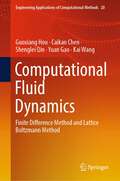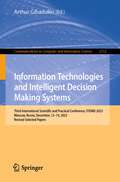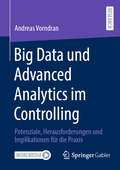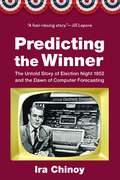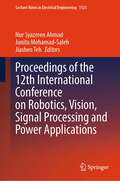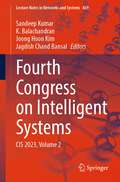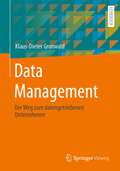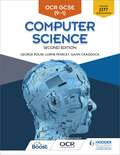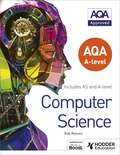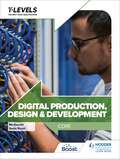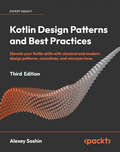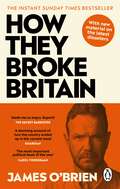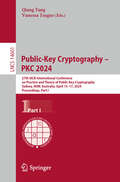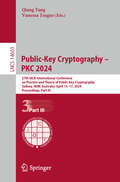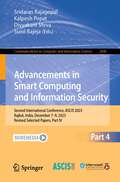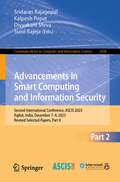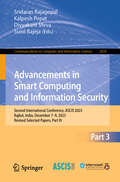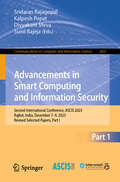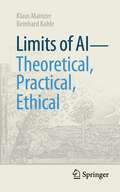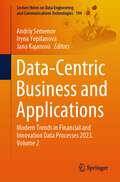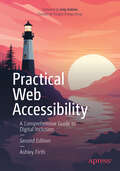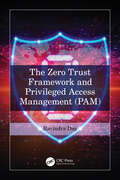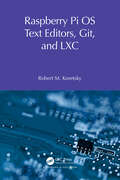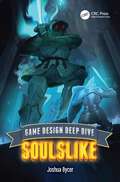- Table View
- List View
Computational Fluid Dynamics: Finite Difference Method and Lattice Boltzmann Method (Engineering Applications of Computational Methods #20)
by Guoxiang Hou Caikan Chen Shenglei Qin Yuan Gao Kai WangThis book provides a concise and comprehensive introduction to several basic methods with more attention to their theoretical basis and applications in fluid dynamics. Furthermore, some new ideas are presented in this book, for example, a method to solve the transition matrix by difference operator transformation. For this method, the book gives the definition of Fourier integral transformation of translation operator, and proves the transition matrix equaling to the differential operator transformation, so that it is extended to general situations of explicit, implicit, multi-layer difference equations, etc. This flexible approach is also used in the differential part. In addition, the book also includes six types of equivalent stability definitions in two ways and deeply analyzes their errors, stabilities and convergences of the difference equations. What is more important, some new scientific contributions on lattice Boltzmann method (LBM) in recent years are presented in the book as well. The authors write the book combining their ten years teaching experience and research results and this book is intended for graduate students who are interested in the area of computational fluid dynamics (CFD). Authors list some new research achievements, such as simplified lattice Boltzmann method, the simplified lattice Boltzmann flux solver and discrete unified gas kinetic scheme, and expect that this new information could give readers possible further investigating ideas in their future research on CFD area.
Information Technologies and Intelligent Decision Making Systems: Third International Scientific and Practical Conference, ITIDMS 2023, Moscow, Russia, December, 12-14, 2023, Revised Selected Papers (Communications in Computer and Information Science #2112)
by Arthur GibadullinThis book constitutes the refereed post proceedings of the Third International Scientific and Practical Conference on Information Technologies and Intelligent Decision Making Systems, ITIDMS 2023, held in Moscow, Russia, during December, 12-14, 2023. The 18 full papers included in this book were carefully reviewed and selected from 54 submissions. The papers presented in this volume focus on topics such as digital, intellectual and information transformation, the development of computer models and the improvement of automated and computing processes.
Big Data und Advanced Analytics im Controlling: Potenziale, Herausforderungen und Implikationen für die Praxis
by Andreas VorndranDie Digitalisierung und Entwicklungen im Gebiet der künstlichen Intelligenz haben in den letzten Jahren erhebliche Veränderungen in der Gesellschaft und der Unternehmenspraxis hervorgerufen. Aufkommende Technologien in den Feldern Big Data und Advanced Analytics werden auch im Controlling zunehmend diskutiert oder bereits eingesetzt. Dabei befinden sich der Wissensstand, inwieweit Big Data und Advanced Analytics das Controlling beeinflussen und verändern können, und die praktische Anwendung noch in einem frühen Stadium. Diese Arbeit befasst sich deshalb mit der Untersuchung der möglichen Auswirkungen von Big Data und Advanced Analytics im Controlling. Vor diesem Hintergrund werden die Einflüsse dieser digitalen Trends auf den Informationsversorgungsprozess des Controllings, auf die Erfüllung Controlling-spezifischer Anforderungen an Informationen und auf das Forecasting, die Budgetierung und die strategische Planung analysiert. Ferner werden praxisrelevante Herausforderungen, Grenzen und Risiken bei der Implementierung und Nutzung identifiziert sowie Implikationen zu deren Umgang zur Ausschöpfung der Potenziale abgeleitet.
Predicting the Winner: The Untold Story of Election Night 1952 and the Dawn of Computer Forecasting
by Ira ChinoyThe history of American elections changed profoundly on the night of November 4, 1952. An outside-the-box approach to predicting winners from early returns with new tools—computers—was launched live and untested on the newest medium for news: television. Like exhibits in a freak show, computers were referred to as &“electronic brains&” and &“mechanical monsters.&” Yet this innovation would help fuel an obsession with numbers as a way of understanding and shaping politics. It would engender controversy down to our own time. And it would herald a future in which the public square would go digital. The gamble was fueled by a crisis of credibility stemming from faulty election-night forecasts four years earlier, in 1948, combined with a lackluster presentation of returns. What transpired in 1952 is a complex tale of responses to innovation, which Ira Chinoy makes understandable via a surprising history of election nights as venues for rolling out new technologies, refining methods of prediction, and providing opportunities for news organizations to shine. In Predicting the Winner Chinoy tells in detail for the first time the story of the 1952 election night—a night with continuing implications for the way forward from the dramatic events of 2020–21 and for future election nights in the United States.
Proceedings of the 12th International Conference on Robotics, Vision, Signal Processing and Power Applications (Lecture Notes in Electrical Engineering #1123)
by Nur Syazreen Ahmad Junita Mohamad-Saleh Jiashen TehThis book presents selected papers from the Proceedings of the International Conference 12th International Conference on Robotics, Vision, Signal Processing, and Power Applications ROVISP 2023, held in Penang, Malaysia, covering topic areas divided into the following tracks: (1) Robotics, Control, Mechatronics, and Automation; (2) Vision, Image and Signal Processing; (3) Telecommunication Systems and Applications; (4) Electronic Design and Applications; (5) Electrical Power, Energy, and Industrial Applications. Its content highlights state-of-the-art technologies adopted by the relevant industries which appeal to researchers and industrial practitioners working in the field.
Fourth Congress on Intelligent Systems: CIS 2023, Volume 2 (Lecture Notes in Networks and Systems #869)
by Sandeep Kumar K. Balachandran Joong Hoon Kim Jagdish Chand BansalThis book is a collection of selected papers presented at the Fourth Congress on Intelligent Systems (CIS 2023), organized by CHRIST (Deemed to be University), Bangalore, India, under the technical sponsorship of the Soft Computing Research Society, India, during September 4–5, 2023. It includes novel and innovative work from experts, practitioners, scientists, and decision-makers from academia and industry. It covers topics such as the Internet of Things, information security, embedded systems, real-time systems, cloud computing, big data analysis, quantum computing, automation systems, bio-inspired intelligence, cognitive systems, cyber-physical systems, data analytics, data/web mining, data science, intelligence for security, intelligent decision-making systems, intelligent information processing, intelligent transportation, artificial intelligence for machine vision, imaging sensors technology, image segmentation, convolutional neural network, image/video classification, soft computing for machine vision, pattern recognition, human-computer interaction, robotic devices and systems, autonomous vehicles, intelligent control systems, human motor control, game playing, evolutionary algorithms, swarm optimization, neural network, deep learning, supervised learning, unsupervised learning, fuzzy logic, rough sets, computational optimization, and neuro-fuzzy systems.
Data Management: Der Weg zum datengetriebenen Unternehmen
by Klaus-Dieter GronwaldDieses Lehrbuch betrachtet Data Management als interdisziplinäres Konzept mit Fokus auf den Zielen datengetriebener Unternehmen. Im Zentrum steht die interaktive Entwicklung eines Unternehmensdatenmodells für ein virtuelles Unternehmen mit Unterstützung eines online Learning Games unter Einbeziehung der Aufgaben, Ziele und Grundsätze des Data Managements, typischer Data-Management-Komponenten und Frameworks wie Datenmodellierung und Design, Metadaten Management, Data Architecture, und Data Governance, und verknüpft diese mit datengetriebenen Anwendungen wie Business Warehousing, Big Data, In-Memory Data Management, und Machine Learning im Data Management Kontext.Das Buch dient als Lehrbuch für Studierende der Informatik, der Wirtschaft und der Wirtschaftsinformatik an Universitäten, Hochschulen und Fachschulen und zur industriellen Aus- und Weiterbildung.
OCR GCSE Computer Science, Second Edition
by George Rouse Lorne Pearcey Gavin Craddock Ian PagetWritten by leading Computer Science teachers, this brand-new textbook will guide students through the updated OCR GCSE Computer Science specification topic by topic, and provide them with standalone recap and review sections, worked examples and clear explanations of complex topics.This Student Book:>> develops computational thinking skills in line with the new Practical Programming element of Component 02>> provides differentiated material with the 'beyond the spec' feature>> includes standalone recap and review sections at the end of each chapter>> includes answers to the Knowledge Check questions to support independent learning>> provides definitions of technical terms, along with a glossary of words that will be needed for assessment.Looking for answers for the Student Book? They can be found at the back of the print textbook.You can now access a free set of practice questions on the Hodder Education website. Please note, these questions are not endorsed by OCR and have not been subject to any OCR quality assurance processes.George Rouse, Lorne Pearcey and Gavin Craddock are highly respected and widely published authors of resources.
AQA A level Computer Science
by Bob ReevesExam Board: AQALevel: AS/A-levelSubject: Computer ScienceFirst Teaching: September 2015First Exam: June 2016This title has been approved by AQA for use with the AS and A-level AQA Computer Science specifications. AQA A-level Computer Science gives students the chance to think creatively and progress through the AQA AS and A-level Computer Science specifications. Detailed coverage of the specifications will enrich understanding of the fundamental principles of computing, whilst a range of activities help to develop the programming skills and computational thinking skills at A-level and beyond. - Enables students to build a thorough understanding of the fundamental principles in the AQA AS and A-Level Computer Science specifications, with detailed coverage of programming, algorithms, data structures and representation, systems, databases and networks, uses and consequences.- Helps to tackle the various demands of the course confidently, with advice and support for programming and theoretical assessments and the problem-solving or investigative project at A-level.- Develops the programming and computational thinking skills for A-level and beyond - frequent coding and question practice will help students apply their knowledge of the principles of computer science, and design, program and evaluate problem-solving computer systems. Bob Reeves is an experienced teacher with examining experience, and well-respected author of resources for Computing and ICT across the curriculum.
Digital Production, Design and Development T Level: Core
by Sonia Stuart Maureen EverettTackle the core component of the Digital Production, Design and Development T Level with this comprehensive resource.Written by highly respected authors, Mo Everett and Sonia Stuart, this clear, accessible and thorough textbook will guide learners through the key principles, concepts and terminology, as well as providing the inside track into what it takes to kick-start a career in the Digital world.- Simplify complex topics with summary tables, diagrams, key term definitions and a glossary.- Track and strengthen knowledge by using learning outcomes at the beginning of every unit and 'Test Yourself' questions.- Apply knowledge and understanding across 100s of engaging activities and research tasks.- Prepare for exams and the employer-set project using practice questions and project practice exercises.- Get ready for the workplace with industry tips and real-world examples.- Be guided through the course by expert authors Mo Everett and Sonia Stuart, who draw on their extensive industry and teaching experience.
Kotlin Design Patterns and Best Practices: Elevate your Kotlin skills with classical and modern design patterns, coroutines, and microservices
by Alexey SoshinDive deep into Kotlin design patterns, explore idiomatic functional programming, and master microservices with frameworks like Arrow, Ktor, and Vert.x.Key FeaturesStart from basic Kotlin syntax and go all the way to advanced topics like Coroutines and structural concurrencyLearn how to select and implement the right design pattern for your next Kotlin projectGet to grips with concurrent and reactive microservices with Ktor and Vert.xBook DescriptionFor developers who are working with design patterns in Kotlin, this practical guide offers an opportunity to put their knowledge into practice. The book covers classical and modern design patterns, and provides a hands-on approach to implementation, along with associated methodologies. The third edition stays current with Kotlin updates, spanning from version 1.6 onwards, and offers in-depth insights into topics like structured concurrency and context receivers. The book starts by introducing essential Kotlin syntax and the significance of design patterns, covering classic Creational, Structural, and Behavioral patterns. It then progresses to explore functional programming, Reactive, and Concurrent patterns, including detailed discussions on coroutines and structured concurrency. As you navigate through these advanced concepts, you'll enhance your Kotlin coding skills. The book also delves into the latest architectural trends, focusing on microservices design patterns and aiding your decision-making process when choosing between architectures. By the end of the book, you will have a solid grasp of these advanced concepts and be able to apply them in your own projects.What you will learnUtilize functional programming and coroutines with the Arrow frameworkUse classical design patterns in the Kotlin programming languageScale your applications with reactive and concurrent design patternsDiscover best practices in Kotlin and explore its new featuresApply the key principles of functional programming to KotlinFind out how to write idiomatic Kotlin code and learn which patterns to avoidHarness the power of Kotlin to design concurrent and reliable systems with easeCreate an effective microservice with Kotlin and the Ktor frameworkWho this book is forThis book is for developers who want to apply design patterns they've learned from other languages in Kotlin and build reliable, scalable, and maintainable applications. You'll need a good grasp on at least one programming language before you get started with this book. Familiarity with classical design patterns from your language of choice would be helpful, but you'll still be able to follow along if you code in other languages
How They Broke Britain: The Instant Sunday Times Bestseller
by James O'Brien***THE RUNAWAY BESTSELLER, WITH NEW MATERIAL FOR THE PAPERBACK***THE REVEALING, DEFINING ACCOUNT OF THE DARK NETWORK THAT BROKE OUR COUNTRY.Something has gone really wrong in Britain.Our economy has tanked, our freedoms are shrinking, and social divisions are growing. Our politicians seem most interested in their own careers, and much of the media only make things worse. We are living in a country almost unrecognisable from the one that existed a decade ago. But whose fault is it really? Who broke Britain and how did they do it?Bold and incisive as ever, James O'Brien reveals the shady network of influence that has created a broken Britain of strikes, shortages and scandals. He maps the web connecting dark think tanks to Downing Street, the journalists involved in selling it to the public and the media bosses pushing their own agendas. Over ten chapters, each focusing on a particular person complicit in the downfall, James O'Brien reveals how a select few have conspired - sometimes by incompetence, sometimes by design - to bring Britain to its knees.
How to Profit from Auctions
by Fiona ShoopTV Programs like Bargain Hunt and Cash in the Attic have increased the publics interest in attending auctions. This invaluable guide shows all the tricks of the trade from looking for costly scratches hidden under labels when buying to negotiating for a better rate when selling, as well as how to arrange free collection and getting the best from your local auction house. Whether you want to learn how to bid so youre seen by the auctioneer or want to ensure your commission bid stands a better chance, antiques expert, Fiona Shoops advice could make you thousands. Contains a glossary to decipher common auction terms, as well as a detailed county by county auction directory with over 600 auctions listed.
Public-Key Cryptography – PKC 2024: 27th IACR International Conference on Practice and Theory of Public-Key Cryptography, Sydney, NSW, Australia, April 15–17, 2024, Proceedings, Part I (Lecture Notes in Computer Science #14601)
by Qiang Tang Vanessa TeagueThe four-volume proceedings set LNCS 14601-14604 constitutes the refereed proceedings of the 27th IACR International Conference on Practice and Theory of Public Key Cryptography, PKC 2024, held in Sydney, NSW, Australia, April 15–17, 2024. The 54 papers included in these proceedings were carefully reviewed and selected from 176 submissions. They focus on all aspects of signatures; attacks; commitments; multiparty computation; zero knowledge proofs; theoretical foundations; isogenies and applications; lattices and applications; Diffie Hellman and applications; encryption; homomorphic encryption; and implementation.
Public-Key Cryptography – PKC 2024: 27th IACR International Conference on Practice and Theory of Public-Key Cryptography, Sydney, NSW, Australia, April 15–17, 2024, Proceedings, Part III (Lecture Notes in Computer Science #14603)
by Qiang Tang Vanessa TeagueThe four-volume proceedings set LNCS 14601-14604 constitutes the refereed proceedings of the 27th IACR International Conference on Practice and Theory of Public Key Cryptography, PKC 2024, held in Sydney, NSW, Australia, April 15–17, 2024. The 54 papers included in these proceedings were carefully reviewed and selected from 176 submissions. They focus on all aspects of signatures; attacks; commitments; multiparty computation; zero knowledge proofs; theoretical foundations; isogenies and applications; lattices and applications; Diffie Hellman and applications; encryption; homomorphic encryption; and implementation.
Advancements in Smart Computing and Information Security: Second International Conference, ASCIS 2023, Rajkot, India, December 7–9, 2023, Revised Selected Papers, Part IV (Communications in Computer and Information Science #2040)
by Sridaran Rajagopal Kalpesh Popat Divyakant Meva Sunil BajejaThis 4-volume CCIS post-conference set represents the proceedings of the Second International Conference on Advances in Smart Computing and Information Security, ASCIS 2023, in Rajkot, Gujarat, India, December 2023. The 91 full papers and 36 short papers in the volume were carefully checked and selected from 432 submissions. Various application areas were presented at the conference, including healthcare, agriculture, automotive, construction and engineering, pharmaceuticals, cybercrime and sports.
Advancements in Smart Computing and Information Security: Second International Conference, ASCIS 2023, Rajkot, India, December 7–9, 2023, Revised Selected Papers, Part II (Communications in Computer and Information Science #2038)
by Sridaran Rajagopal Kalpesh Popat Divyakant Meva Sunil BajejaThis 4-volume CCIS post-conference set represents the proceedings of the Second International Conference on Advances in Smart Computing and Information Security, ASCIS 2023, in Rajkot, Gujarat, India, December 2023. The 91 full papers and 36 short papers in the volume were carefully checked and selected from 432 submissions. Various application areas were presented at the conference, including healthcare, agriculture, automotive, construction and engineering, pharmaceuticals, cybercrime and sports.
Advancements in Smart Computing and Information Security: Second International Conference, ASCIS 2023, Rajkot, India, December 7–9, 2023, Revised Selected Papers, Part III (Communications in Computer and Information Science #2039)
by Sridaran Rajagopal Kalpesh Popat Divyakant Meva Sunil BajejaThis 4-volume CCIS post-conference set represents the proceedings of the Second International Conference on Advances in Smart Computing and Information Security, ASCIS 2023, in Rajkot, Gujarat, India, December 2023. The 91 full papers and 36 short papers in the volume were carefully checked and selected from 432 submissions. Various application areas were presented at the conference, including healthcare, agriculture, automotive, construction and engineering, pharmaceuticals, cybercrime and sports.
Advancements in Smart Computing and Information Security: Second International Conference, ASCIS 2023, Rajkot, India, December 7–9, 2023, Revised Selected Papers, Part I (Communications in Computer and Information Science #2037)
by Sridaran Rajagopal Kalpesh Popat Divyakant Meva Sunil BajejaThis 4-volume CCIS post-conference set represents the proceedings of the Second International Conference on Advances in Smart Computing and Information Security, ASCIS 2023, in Rajkot, Gujarat, India, December 2023. The 91 full papers and 36 short papers in the volume were carefully checked and selected from 432 submissions. Various application areas were presented at the conference, including healthcare, agriculture, automotive, construction and engineering, pharmaceuticals, cybercrime and sports.
Limits of AI - theoretical, practical, ethical (Technik im Fokus)
by Klaus Mainzer Reinhard KahleArtificial intelligence is a key technology with great expectations in science, industry, and everyday life. This book discusses both the perspectives and the limitations of this technology. This concerns the practical, theoretical, and conceptual challenges that AI has to face. In an early phase of symbolic AI, AI focused on formal programs (e.g., expert systems), in which rule-based knowledge was processed with the help of symbolic logic. Today, AI is dominated by statistics-based machine learning methods and Big Data. While this sub-symbolic AI is extremely successful (e.g., chatbots like ChatGPT), it is often not transparent. The book argues for explainable and reliable AI, in which the logical and mathematical foundations of AI-algorithms become understandable and verifiable.
Data-Centric Business and Applications: Modern Trends in Financial and Innovation Data Processes 2023. Volume 2 (Lecture Notes on Data Engineering and Communications Technologies #194)
by Andriy Semenov Iryna Yepifanova Jana KajanováThis book examines aspects of financial and investment processes, as well as the application of information technology mechanisms to business and industrial management, using the experience of the Ukrainian economy as an example. An effective tool for supporting business data processing is combining modern information technologies and the latest achievements in economic theory. The variety of industrial sectors studied supports the continuous acquisition and use of efficient business analysis in organizations. In addition, the book elaborates on multidisciplinary concepts, examples, and practices that can be useful for researching the evolution of developments in the field. Also, in this book, there is a description of analysis methods for making decisions in business, finance, and innovation management.
Practical Web Accessibility: A Comprehensive Guide to Digital Inclusion
by Ashley FirthEveryone deserves to use the Internet. An estimated 1.3 billion people experience significant disability. That’s 16percent of the world’s population, or one in six of us. At the same time, over 96 percent of the one million most popular websites have an accessibility issue. Add to this the massive rise in legal cases around sites not being accessible, including Beyoncé, Disney, and Netflix, and you have an important topic that more and more people are starting to engage with.In this updated and revamped second edition of the Amazon technology chart-topping Practical Web Accessibility, you’ll be guided through a broad range of disabilities and access needs. You’ll understand the ways these users typically engage with the web, the barriers they often face, and practical advice on how your websites and content can be compliant, but more than that, inclusive and enjoyable to use. There’s also a new chapter on “Outsourcing Accessibility,” exploring third party “bolt-on” tools, “build your own website” platforms like Wix, and popular design systems. You‘ll explore whether they’re helpful or detrimental in the fight to make the web more accessible.Throughout this book you’ll learn to test for, spot, and fix web accessibility issues for a wide range of physical and mental impairments. Featuring content from the latest compliance frameworks, including the newly released WCAG 2.2 and exploratory concepts in WCAG 3, you’ll see how to go beyond the basic requirements in order to help your users. You’ll also learn that an accessible approach won’t just help people with disabilities, it will improve your website for everyone.This book comes complete with practical examples you can use in your own sites, along with a brand-new approach to auditing and improving a website’s accessibility, and a team’s approach to it, based on tools created by the author and refined over years as a consultant — The FAIR framework and ACCESS checklist. With these tools, you can set up processes for yourself and your team that will drastically improve the accessibility of your sites and, importantly, keep them that way in the future. Suitable for those of any profession or experience level, Practical Web Accessibility gives you all the information you need to ensure that your sites are truly accessible for the modern, inclusive web. If you would like to learn about web accessibility in a clear and actionable way, this book is for you.What You Will LearnA greater understanding of a vast range of disabilities that have online access needs, and the issues they typically face accessing content online.Ways to apply the practical steps required to cater for those needs.How to take your sites, and colleagues, on a journey from being inaccessible to accessible.The importance of accessibility in your designs, code, content, and more.The best ways to test andimprove your sites, so you can be compliant, and truly accessible. Who This Book Is For Anyone, regardless of what they do, who wants to learn how to make websites and their content more accessible for those with disabilities. In the world of web, the book has been used by front and backend developers, designers, product and project managers, team and business leaders.
The Zero Trust Framework and Privileged Access Management (PAM)
by Ravindra DasThis book is about the Zero Trust Framework. Essentially, this is a methodology where the IT/Network Infrastructure of a business is segmented into smaller islands, each having its own lines of defense. This is primarily achieved through the use of Multifactor Authentication (MFA), where at least three more authentication layers are used, preferably being different from one another.Another key aspect of the Zero Trust Framework is known as Privileged Access Management (PAM). This is an area of Cybersecurity where the protection of superuser accounts, rights, and privileges must be protected at all costs from Cyberattackers. In this regard, this is where the Zero Trust Framework and PAM intertwine, especially in a Cloud-based platform, such as Microsoft Azure.However, as it has been reviewed in one of our previous books, the use of passwords is now becoming a nemesis, not only for individuals but for businesses as well. It is hoped that by combining the Zero Trust Framework with PAM, password use can be eradicated altogether, thus giving rise to a passwordless society.
Raspberry Pi OS Text Editors, git, and LXC: A Practical Approach (Raspberry Pi OS System Administration with systemd)
by Robert M KoretskyThe third volume in a new series exploring the basics of Raspberry Pi Operating System administration, this installment builds on the insights from Volumes 1 and 2 to provide a compendium of easy-to-use and essential guidance for Raspberry Pi system administration for novice users, with specific focus on Text Editors, git/ GitHub, and LXC/LXD.The overriding idea behind system administration of a modern, 21st-century Linux system, such as the Raspberry Pi OS, is the use of systemd to ensure that the Linux kernel works efficiently and effectively to provide these three foundation stones of computer operation and management: computer system concurrency, virtualization, and secure persistence. This third volume includes a beginner’s compendium of essential text-based Linux commands, a complete tutorial on the most important Raspberry Pi OS Text Editors, a description of uses of the git command, and a thorough explication of container virtualization with LXC/LXD and Docker.This book is aimed at students and practitioners looking to maximize their use of the Raspberry Pi OS. With plenty of practical examples, projects, and exercises, this volume can also be adopted in a more formal learning environment to supplement and extend the basic knowledge of a Linux operating system.
Game Design Deep Dive: Soulslike
by Joshua BycerGame Design Critic Joshua Bycer is back with another entry in the Game Design Deep Series to focus on the youngest genre yet: soulslikes. Over a decade, From Software defined a new genre that has led to studios chasing after them hit after hit. In this book, Josh will cover the history of the genre and popular soulslike games of the 2010s and discuss what aspects of design make a game a soulslike. The first book looking at the history of the genre A breakdown of both action and RPG design for fans and designers of both A lesson on difficulty in games and why harder doesn’t mean better
